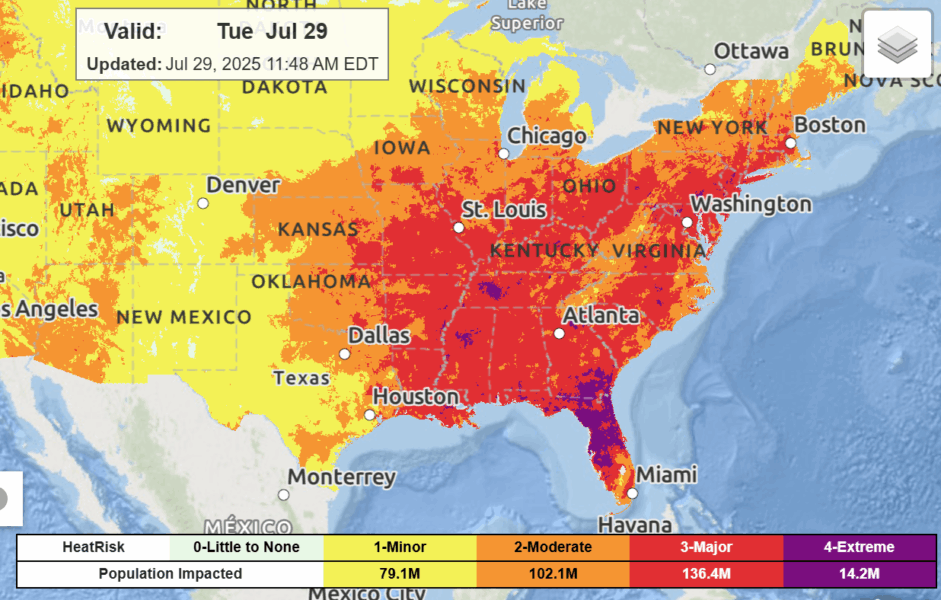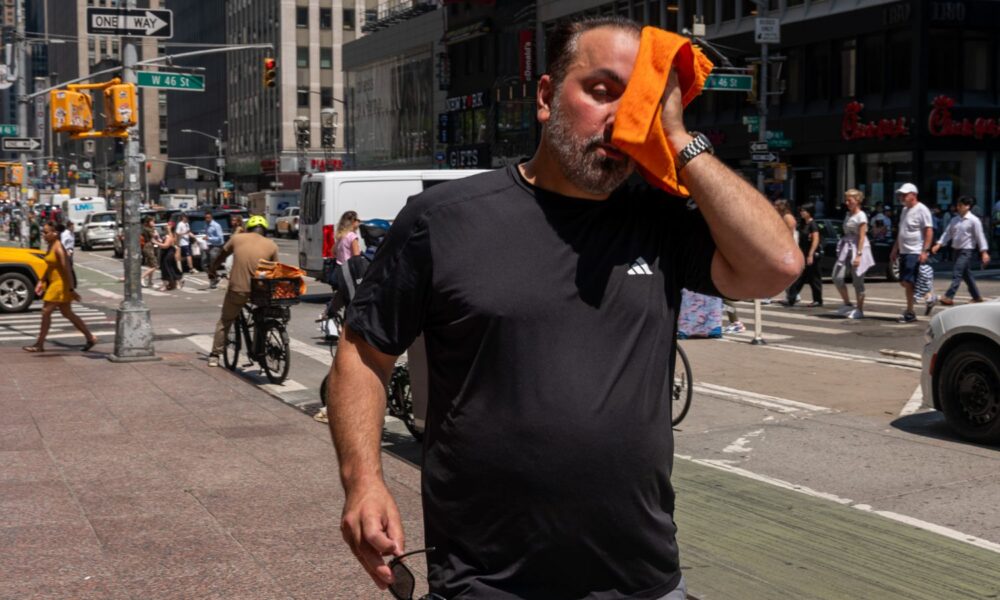Summer 2025 is, has been, and will continue to be really hot. Lives have been lost, records have toppled, unprecedented conditions are appearing around the globe. But with global warming accelerating, this summer could very well be the coolest of the rest of our lives.
Extreme heat is going to get a lot more extreme. The best time to act was decades ago when the science became clear about the threat we face. But the fossil fuel industry lied and denied to keep society hooked on its heat-trapping product, and here we are today, with 115 degree heat index forecasts in the Southeast this week. Nobody wants to live in the climate future we’re entering, so the second best time to act is now.
How hot is it?
2025 is shaping up to be among the warmest years on record, behind 2024 but rivaling 2023. Globally, northern hemisphere summer temperature records are being broken in some big and shocking ways, from the Arctic to Oceania, and in many places in between.
Here in the US, a summer that was forecast to see above normal heat is really delivering. Intense heat and humidity blanketed much of the population prior even to the official start of summer. Intense heat waves have made repeat appearances, including this week, when as of this writing, 136 million people in the Eastern half of the country were sweltering under “major heat risk,” with another 14 million under “extreme” risk. Some areas have seen heat index conditions of 110, 115 and 120 degrees. Heat-associated deaths, always badly undercounted, are mounting.

Looking ahead, the monthly outlook for August shows above-normal heat in the Western half of the country. No region is getting off un-baked.
“If you can’t take the heat, get out of the kitchen” loses its bite when the whole planet is the kitchen, and we’re just starting to cook. Here are 6 things to know about heat in 2025.
1: Of course it’s climate change
Our friends at Climate Central show with their Climate Shift Index that this week’s heat over the Eastern US was made 3 to 5 times more likely because of climate change. Around the world, climate change made large areas of the current sea surface heat more than 100 times more likely to occur.
But look… whether extreme heat—or flooding or drought or a storm—on a given day was caused or worsened by climate change is no longer a genuinely useful question. Our climate has already changed. Our climate is still changing and at an accelerating rate. We have created a world that is 1.1 degrees C warmer than the historical average. Everything that happens now, weather-wise, happens within a changed climate. Rather than more time and energy being spent proving something was “caused by climate change,” let’s let the denialists spend their time and energy trying to prove it wasn’t. And better questions for us to ask today are: why are we still using fossil fuels? And why is that industry and its political enablers not yet paying the price for what they’ve done to all of us? Why—I mean why—are we basically letting them run the world?
2: Hot as it is, this could be the coolest summer of the rest of our lives
As global average temperatures increase, summer heat increases, too. The 10 hottest years on record are all in the last decade, with 2024 surpassing 2023 as the hottest in nearly 200 years of record keeping. 2025 could be the second-hottest. So that’s where we are.
Where we’re headed is still in large part determined by our actions to curb fossil fuel pollution, but it’s inevitably going to be hotter.
In September, parties to the Paris Climate Agreement (which no longer includes the US) will submit plans for curbing emissions consistent with the agreement’s goal of keeping global temperature increases well below 2.0 C, preferably to 1.5 C. But barring some bolt from the blue, that 1.5 C goal has all but slipped beyond reach. Current rates of emissions have us on track for an increase of between 2.2 and 3.4 degrees C by 2100.
What does this mean in terms of summer heat? According to my team’s 2019 analysis, Killer Heat, without strong action to curb emissions, cities across the country can expect historically rare heat index conditions of 105 F or greater to become commonplace by mid-century. Take Raleigh, NC, as an example, where that kind of heat would be experienced 26 days per year on average by mid-century. Later in the century, extreme heat would dominate the summer season, occurring ~56 days per year.
To see heat index forecasts for your own city, check out our interactive tool here.
We are unlikely to see years where global average temperatures dip significantly. Some years, we’ll experience the cooling effects of a La Nina and the annual increase in temperature could be smaller; other years, we’ll experience the added heat of an El Nino and the rise may be steeper. But overall, the rate of global warming is accelerating.
All this to say that our future is on an increasingly hot planet with increasingly hot summers.
3: The ocean is losing its cool
Given how busily industrialized nations have been burning fossil fuels and filling the atmosphere with heat-trapping emissions, we could have seen temperature increases over land far greater than we have. For sparing us this consequence of our actions, we have the ocean to thank. The ocean has absorbed some 90 percent of the excess heat trapped in the atmosphere by fossil fuel emissions, storing that heat in the surface and even deep waters. But given this heat storage, we are now seeing record high average ocean temperatures, including ocean heat waves, which are doing major ecological harm. (These temperatures are also driving the current and most extensive global coral bleaching crisis. Not all reefs will recover, and those that do face a still-warming ocean.)
From exacerbating land heat waves to increasing humidity, hot oceans may provide less heat relief and more heat trouble in our future.
4: Heat can kill us—and is killing us
Heat is the number one weather-related killer in the US and around the world. Officially, heat caused roughly 2400 deaths in both 2023 and 2024 in the US. But heat-related deaths are generally greatly undercounted, in part because heat stress can make preexisting health conditions worse without presenting as the primary problem. Certain bodies are most at risk in extreme heat, including people who are elderly, very young, pregnant, on certain medications, and/or living with underlying health conditions, like heart disease or obesity.
Then societal factors create major added risk, making heat dangerous for people who are outdoor workers, low-income, unhoused, incarcerated and/or living in urban heat islands. In an overheating world, access to cooling becomes a matter of life and death, and for those people, access is not guaranteed. Already this year, extreme heat is responsible for 150 confirmed deaths in the US.
The grind of surviving amidst extreme heat can be harder still in the Global South, where people in overcrowded and impoverished cities like Karachi, Pakistan, can find little relief.
I often wonder if our failure to take climate change more seriously is mostly a failure of imagination. But we should imagine heat waves of unprecedented duration, intensity and mortality, because they are coming. And we should act on climate with fervency.
5: We are making a U-turn away from solutions
This week, the Trump administration is announcing its most profound denial of our climate reality yet, with its repeal of the EPA’s 2009 Endangerment Finding and clean vehicles regulations.
This, combined with existing and proposed cuts to US climate science across federal agencies, paint the stark picture of an administration doing the express bidding of the fossil fuel industry—an industry willing to sacrifice our future for a few more years of profit. Including attempting to make climate change disappear.
We should be racing toward the clean energy solutions that can slow this runaway climate train, but the Trump administration and Congress are gutting US progress—throwing the engineer off the train and dismantling the brake system—setting us and the whole world back. The sheer economic stupidity and coming damage… the injustice to people today and to all generations to come… the immorality and craven greed of it all… they’re hard to overstate.
6: But heat can respond quickly to reduced heat-trapping emissions—if we act
If emissions are brought to net zero, warming can slow dramatically. The planet won’t cool; that will be a longer-term process. There are uncertainties, including how quickly the ocean will respond and how other, non-CO2 heat-trapping gases will factor in. And there are no guarantees when so many geophysical processes are being disrupted and thresholds are being neared. But stabilizing global average temperatures can stabilize the increase in extreme heat. There is an upshot, it’s still within reach, we just need to act.
If you can’t take the heat, organize the kitchen
What can we do? The list is long and—let’s be clear—needs to be part of a longer-term transformation of our society and economy. But there are things we can do today.
- Practice heat safety for yourself and those around you.
- Protect vulnerable people by pushing Congress to pass legislation to protect workers from dangerous heat.
- Defend and restore federal climate science by holding members of Congress accountable during August recess.
- Stop the climate gaslighting. We are already struggling to cope with climate change. When people with power deny and downplay the dangers of climate change—while we’re suffering from those very dangers—don’t let them get away with it. Don’t refute the bogus science that they point to, that only gives their bogus science attention. Just point out what they’re trying to do: distract, deny, delay, and keep on profiting.
We’ll obviously need to get ourselves some worthy, qualified leaders first chance we get, lean hard into mitigating and building resilience to climate change, and do more, better, faster.
In the meantime, try to stay cool.

